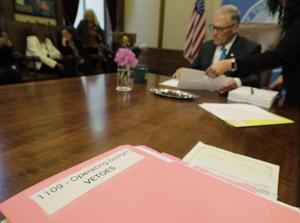Washington Legislature may let Gov. Inslee’s vetoes stand

(The Center Square) – Gov. Jay Inslee has vetoed or partially-vetoed several bills that passed the Washington State Legislature this session by veto-proof majorities. But the Legislature has yet to schedule votes to override those vetoes.
Inslee has vetoed or partially vetoed at least 16 bills from this session, not including budget provisos.
Senate Majority Leader Andy Billig, D-Spokane, and House Speaker Laurie Jinkins, D-Tacoma, did not respond to emails asking about the possibility of the legislature overriding some of Inslee’s vetoes.
At least one prominent Republican lawmaker doesn’t think the Democratically-controlled legislature will act.
“The Democrats in the Legislature have given no indication that they are interested in holding the Governor accountable for anything,” said House Minority Leader J.T. Wilcox, R-Yelm, in an email to The Center Square. “Even the successful lawsuit over illegal vetoes was made moot by later actions of Democrats in the House and Senate.”
In December, the legislature sued the governor over his crossing out single sentences in the state transportation budget regarding eligibility for grants to transit agencies, as well as his removal of verbiage in a bill creating a clean fuel standard that tied the start of enforcement with the passage of a transportation funding package.
In Washington, governors can veto entire bills and entire sections of legislation, but nothing less.
This is the second time the legislature had sued Inslee over questionable use of his line-item veto power.
Weeks before the lawsuit, the state Supreme Court ruled against Inslee in a previous lawsuit for striking out the same lines dealing with transit agency grants in the transportation plan passed in 2019.
Per the Supreme Court’s decision, Inslee conceded in a court order last month that his vetoes in the 2021 transportation budget are “invalid…so there is no dispute between the parties on this issue.”
As to the second portion of the most recent lawsuit, the legislature’s passage of the 16-year, nearly $17 billion “Move Ahead Washington” transportation package seems to have resolved the situation. The legislation includes revised rules for a clean fuel standard without the language Inslee originally deleted.
Inslee had issued partial vetoes to subsections of a cap-and-trade bill and a low carbon fuel standard bill – both of which were passed by the legislature during the 2021 session – thereby undoing the so-called “Grand Bargain” deal linking the two pieces of climate legislation to a transportation funding package, without which the bills would not have been able to take effect.
The governor’s office also doesn’t seem to think the legislature will move to override this year’s vetoes by Inslee.
“Responses from the legislative leadership will be far more helpful than any speculation I could offer, especially if you’re inquiring about a specific bill,” said Jaime Smith, Inslee’s executive director of communications, in an email responding to The Center Square asking if the governor expected veto override votes. “You seem to be hearing as much as we are on the subject.”
In the past, the Legislature has exerted more effort in defying Inslee’s vetoes. In 2016, Inslee vetoed 27 bills and signed 10 into law after the legislature failed to reach a supplemental budget deal during the short session.
The Legislature ended up striking a budget deal in a special session. In a show of defiance, it also overrode every single one of Inslee’s vetoes that year.
Such a move by the Legislature is an exception, however, not the rule.
John Wilkerson, professor and chair of the political science department at the University of Washington, is not surprised by the legislature’s reticence to act now.
“My sense is that veto overrides are uncommon, especially because most vetoes are partial vetoes,” he said via email. “So while there may be a veto proof majority in favor of a bill, that may not extend to the provision that the Governor vetoes. It may also be about intensity – perhaps lawmakers support what is vetoed, but do they care enough about it to convene a special session?”
Disclaimer: This content is distributed by The Center Square
